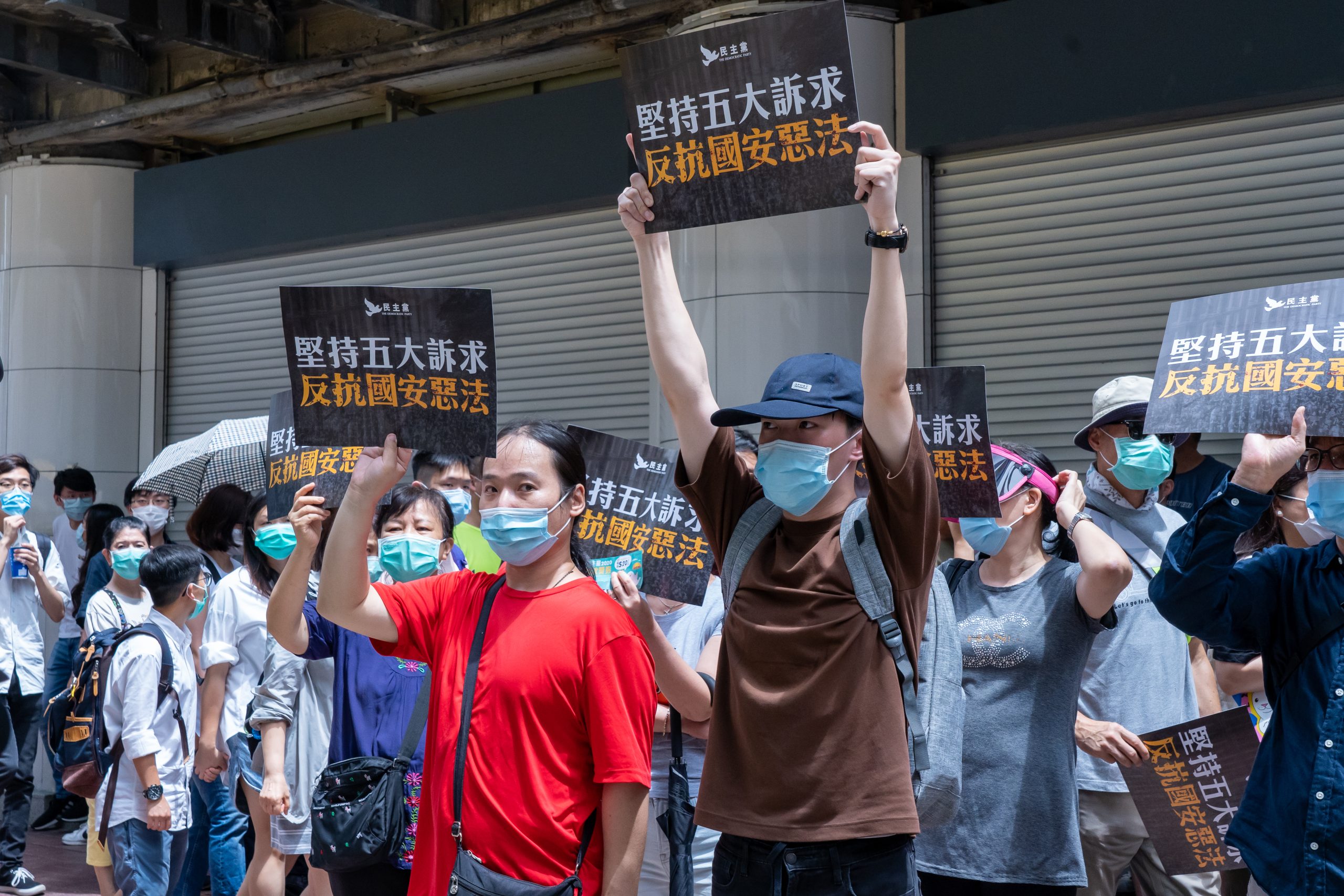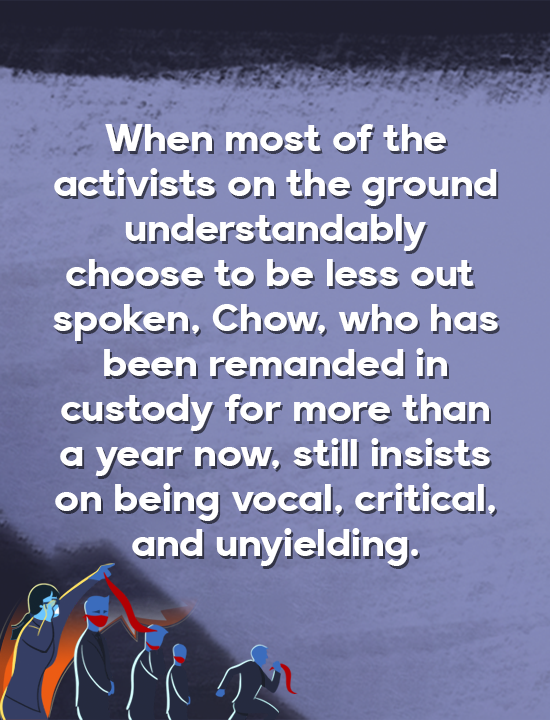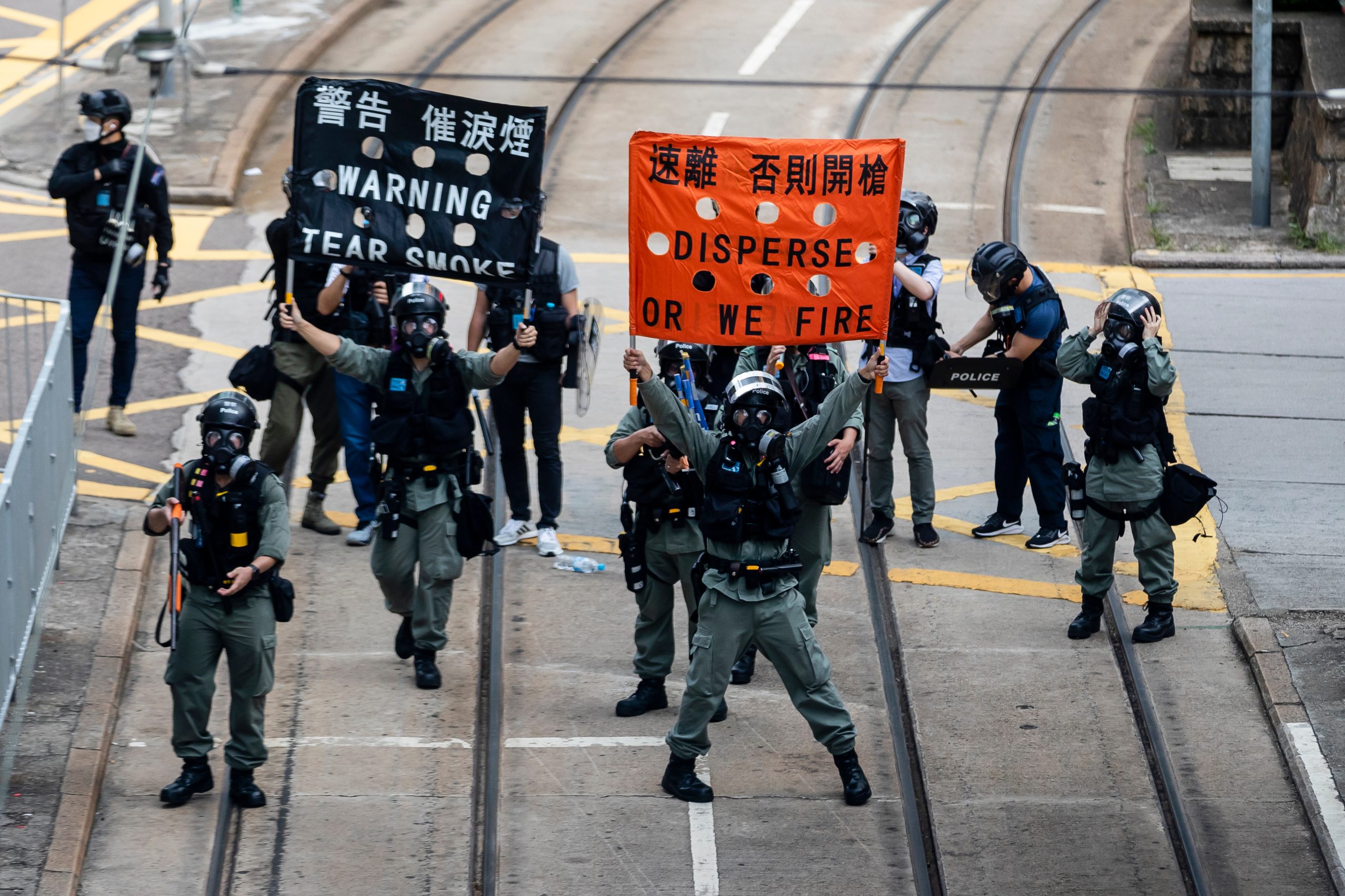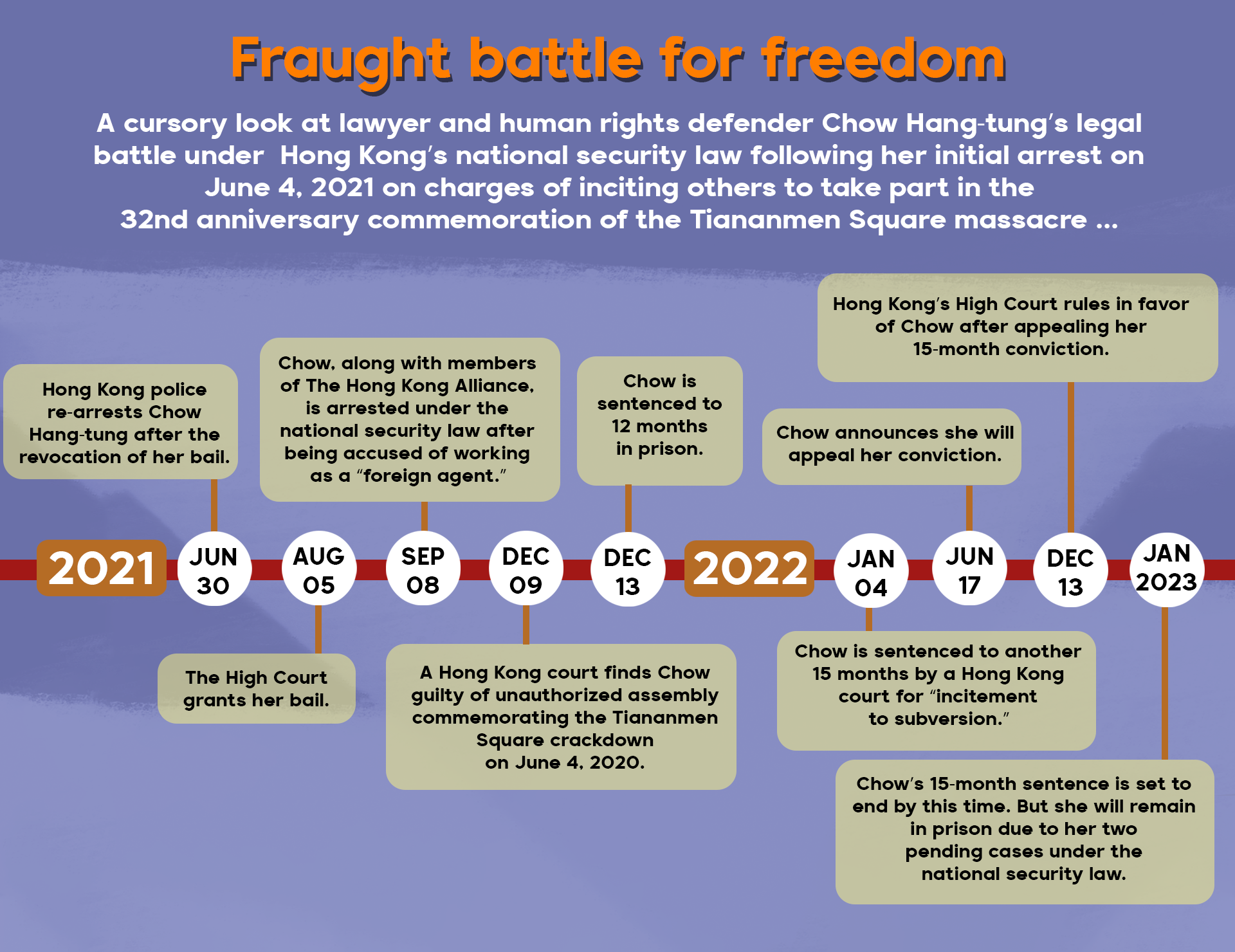|
Getting your Trinity Audio player ready...
|
S
he is an experienced Hong Kong barrister, but Chow Hang Tung has been facing challenges navigating her defense submission. She was arrested on June 4, 2021, for allegedly “inciting” people to gather for an unauthorized assembly to mark the 32nd anniversary of the Tiananmen Square massacre. She was granted bail the next day, but then re-arrested three weeks later for allegedly encouraging others to join a rally for the anniversary of Hong Kong’s handover to China. She spent more than a month in detention before being granted bail, only to be arrested again in September 2021 with several others, supposedly for being part of a group acting as “foreign agents.”
Chow is now facing multiple charges, as the Hong Kong judiciary sets to try the vocal activist with multiple offenses under the Hong Kong National Security Law (HKNSL), promulgated in July 2020 after a series of large-scale protests in the city in 2019. The law, having been directly drafted by the Chinese Government, circumvents the city’s legislature and is unilaterally imposed on the region.

The HKNSL attains a position superior to any other legislation in Hong Kong. Hong Kong’s highest court stipulated in HKSAR v Lai Chee Ying [2021] HKCFA 3 that it is beyond the jurisdiction of the city’s judiciary to determine whether any article in the HKNSL is unconstitutional by evaluating its compatibility with the Hong Kong Basic Law or the Hong Kong Bills of Rights Ordinance, which is in essence the domesticated covenant on civil and political rights in the territory. In other words, the HKNSL is not judicially reviewable in Hong Kong, despite its significant deviation from the long-established common law principles practiced in the territory in various important regards.
For instance, the HKNSL enables the judiciary to displace common law principles like presumption of innocence (the bail test for HKNSL offenses puts presumption of innocence in the second step, and the construction of the test implies the accused already committed a crime, as discussed by the Oxford Human Rights Club), thereby putting defendants into prolonged pre-trial custody. The national security considerations also provide a warrant for courts to dispense with the need for a jury. Furthermore, the HKNSL technically allows for the judiciary to extradite defendants to mainland China, as discussed by Chow in her article on ADC before her detention. Chow and other defendants must now navigate these stipulations, which are unfamiliar to many legal practitioners in the territory.
Speaking out in the midst of silence
Arguably, however, the most crucial implication of the HKNSL is its chilling effect. The demarcation of the HKNSL is ambiguous, if not capricious. It silences nearly all outspoken activists and nongovernment organizations in Hong Kong or forces them out of the territory. The law induces a self-censorship mentality in a city once renowned as free and liberal. People in Hong Kong — and probably in the rest of the world, given the extra-territorial nature of the law, which expands its jurisdiction to govern actions happening anywhere — refrain from criticizing the regime, lest they are framed as seditious, even for a mere adverse comment against the Hong Kong or the Chinese Government.
 Such context may possibly be the reason why Chow stands out. When most of the activists on the ground understandably choose to be less outspoken, Chow, who has been remanded in custody for more than a year now, still insists on being vocal, critical, and unyielding. But the 37-year-old is certainly not naïve or too ill-informed to conduct a high-profile strategy. It is the exact opposite: the human-rights advocate is very well-informed as to what will ensue as she has learnt the lessons from her counterparts in mainland China.
Such context may possibly be the reason why Chow stands out. When most of the activists on the ground understandably choose to be less outspoken, Chow, who has been remanded in custody for more than a year now, still insists on being vocal, critical, and unyielding. But the 37-year-old is certainly not naïve or too ill-informed to conduct a high-profile strategy. It is the exact opposite: the human-rights advocate is very well-informed as to what will ensue as she has learnt the lessons from her counterparts in mainland China.
This is because what further distinguishes Chow most notably is her participation in mainland China-related human rights advocacy. Most of the other activists arrested and prosecuted in Hong Kong in the recent crackdown have been charged for reasons predominantly related to affairs in Hong Kong. Chow, however, attracts her arrests and charges by virtue of her participation in the Hong Kong Alliance in Support of Patriotic Democratic Movements of China (HKA), a disbanded Hong Kong non-profit organization dedicated to advocating for democracy in China. The HKA had organized dozens of assemblies, protests, and other activities regarding human-rights issues happening in mainland China throughout the years.
In fact, Chow has long committed herself to the human-rights situation in China. She had been involved in events organized by the disbanded HKA as early as in 2010. Before she became the vice chairwoman of HKA in 2015, the bespectacled legal practitioner participated in the organization as a staff member and volunteer.
The condition of human rights in China has long been a concern for many. The Chinese government exercises a stringent approach toward any opposition. Thus, in the past, much of the human-rights advocacy targeting mainland China was organized in Hong Kong, when the city was relatively more liberal and open. HKA organized its signature June-Fourth Vigil every year since 1990 to commemorate the 1989 Tiananmen Square protests and massacre — until 2020 when the Hong Kong Government prohibited assemblies for the reason of “preventing the pandemic.” HKA’s subsequent disbandment may simply mean the demise of this signature event, which, if viewed from a broader perspective, may be interpreted as the demise of human- rights advocacy targeting mainland China in Hong Kong.

Chow has long been greatly inspired by Chinese dissidents and activists. Chinese dissidents always experience a great deal of surveillance and oppression. This may be why their resilience and persistence is so inspiring, as they refuse to back down despite decades of hardships and challenges, which can be seen as being relatively new to Hong Kong.
Unbalanced scales of justice
Not many people know about what the enforcement of the HKNSL will entail as it begins to be put into practice. But Chow is undoubtedly as well-informed as someone could be. She has long supported human-rights lawyers in China, who have been, paradoxically, long disenchanted with a legal system far from being genuinely legal when it comes to matters framed as endangering national security. Schemes and tactics are deployed to ensure every participant in the judicial system, including courts and even defense lawyers, is made to serve the regime. Legal procedures and rulings are twisted to guarantee an adverse ruling against the defendant.
This is already happening in Hong Kong’s judiciary; national security-related cases that have so far gone to trial have a 100% conviction rate. When the judiciary has chosen to go against the headwind and hand down rulings unfavorable to the prosecution, the Hong Kong Government immediately intervened and asked for the Central Government’s interpretation of the HKNSL to overrule the decision — as it did in face of the territory’s highest court ruling to allow foreign legal practitioners to be involved in HKNSL cases.

Chow herself is probably disillusioned as well, like those who are familiar with the Chinese NSL have long given up on believing that the system is really about laws. She knows that “justice can never be achieved by answering ‘legal questions’ when the law itself is unjustly written,” when presumption of bail is displaced, the need for jury is dispensed as the court sees fit, and foreign practitioners are likely prohibited. If we learn from the lessons in the mainland, we can anticipate that, as time progresses, only certain elected lawyers will be allowed to represent defendants in the HKNSL. These lawyers, like government-appointed lawyers (guanpailvshi) in mainland China, will work, in essence, for the interests of the regime. In addition, residential surveillance at a designated location, where suspects can be detained outside of judicial supervision, may soon be in place — a procedure criticized by the UN human-rights experts as heightening the risk of torture.
The lessons from Chinese human-rights defenders show that being vocal, making noises, and creating pressure by inviting international scrutiny, usually make for the most effective strategy to play in this system — a system where the regime can twist and deviate as it sees fit. And this is what Chow is doing. While many who face NSL charges keep silent and a low profile, Chow chooses to be vocal, having learned from her Chinese counterparts that one still needs to remember and exercise his or her rights however oppressive and dominating the regime is. She challenged the legitimacy of the stipulations made for national security-related offenses. She criticized the Hong Kong Police for being arbitrary in its investigation work. She held a piece of blank paper to show support of Chinese dissidents. She reminded Hong Kong people not to bow down to authoritarianism.
Sadly, the reality is that most of these will likely be ineffective. One lesson we have learned from Chinese human-rights lawyers is that, for Chow, disbarment is virtually guaranteed, and prolonged home detention even after release will be unsurprising. However, even as people and groups have reluctantly yielded under pressure, Chow takes stock from lawyers and activists in mainland China to show what resistance means. She is well-informed, and she is also informing how rights advocacy can be done in this new era.◉



















